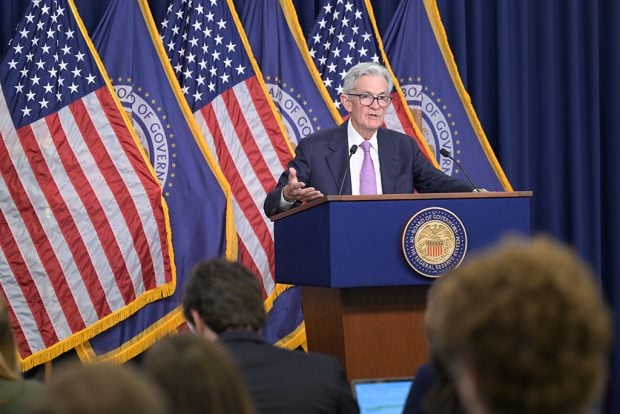 Fed Chair Jerome Powell speaks to reporters in Washington, D.C., Wednesday after announcing a 50-basis-point rate cut.
Fed Chair Jerome Powell speaks to reporters in Washington, D.C., Wednesday after announcing a 50-basis-point rate cut. Credit/Federal Reserve
After staying at 5.3% for more than a year, the Fed cut interest rates by 50 basis points Wednesday and signaled more cuts to come.
The Federal Open Market Committee's projections showed at least half of members expect to cut rates to 4.4% by year's end, down from their 5.1% median expectation at their June meeting. By the end of 2025, the median expectation is that rates will fall to 3.4%, down from an expectation of 4.1% in June.
"The FOMC cut rates more aggressively than it had previously forecast, an acknowledgment that inflation is subsiding and risks to the labor market are rising," Curt Long, deputy chief economist for America's Credit Unions, said.
Fed Chair Jerome Powell said the cuts are the result of inflation moving close to its 2% goal, and a job market that is strong, but cooling. The risks between fueling inflation and job losses are now "about even."
"Our patient approach over the past year has paid dividends," he said. "Inflation is now much closer to our objective and we have gained greater confidence that inflation is moving sustainably toward 2%."
"The economy is strong," he said. "We want to keep it there."
The projections for further cuts depend on whether "the economy evolves as expected," Powell said. "We can go quicker; we can go slower or we can pause, if that's appropriate."
Mike Fratantoni, chief economist of the Mortgage Bankers Association, said investors had been divided about how much the Fed would cut at its meeting Wednesday.
"This decision is likely to spur some rate volatility as investors adjust to this expected path for monetary policy," Fratantoni said. "Governor Bowman dissented from this decision, preferring a 25-basis-point cut, but it seems that the rest of the Committee is more worried about the weakening job market."
Fratantoni said the FOMC projections showed inflation is returning to target more quickly than members had expected in June and that the unemployment rate has "moved higher and is likely to stay higher than expected."
"While not likely to be in a recession, the U.S. economy is likely in for a period of slower economic growth," Fratantoni said.
The FOMC's estimates of what constitutes a neutral fed funds rate keeps moving up, and committee members see a range from 2.5% to 3.5% as consistent with neutral in the long run, he said.
As for mortgage rates, the market had probably baked in most of the cuts already.
"Lower mortgage rates, now close to 6%, have resulted in much more refinance and some additional purchase activity in recent weeks," he said. "We do expect that if mortgage rates remain near these levels, it will support a stronger than typical fall housing market and suggest that next spring could see a real rebound in activity."
Jonathan Smoke, chief economist for Cox Automotive, said the rate cut paves the way for stronger car sales, but rates on auto loans might be among slowest to fall.
"Consumers should see more immediate changes in the rates charged on credit cards, which should help improve the financial status of consumers who have built up balances to maintain spending," Smoke said.
"Interest expense on credit cards has been crowding out spending on goods and services and has likely contributed to delinquencies and defaults on credit cards and auto loans," he said.
Comments
Post a Comment
Please no profanity or political comments.